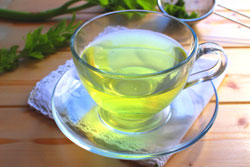Lovely Lovage aka Love Parsley

Lovage (Levisticum officinale) aka love-ache or love parsley, is one of our most ancient herbs and a much-used mainstay of monastery gardens. Popular for love potions, it was thought to be an aphrodisiac, hence its common names.
Recently, it’s had a bit of a make-over: nutrient-rich, and an aid to digestion, it’s one of the recommended foods in the Sirtfood diet list.
Related to angelica, carrot, celery and parsley, all parts of the plant are edible: roots, young, tender central stems, young leaves and ripe seeds.
In common with many herbs, avoid during pregnancy of if you have kidney problems.
Aromatic and slightly medicinal lovage’s deep green scent combines hints of celery, parsley and angelica.
As a general guide, lovage tastes twice as strong as celery. Just think of it as turbo-charged super-celery: try it in this unusual tisane.
Lovage Tisane
Extremely savoury, lovage tea is more like a broth than a tea.
Use 1 tablespoon/small handful of chopped and bruised fresh lovage leaves, or 1 teaspoon of dried, to one cupful of boiled water. Steep for 15 minutes. Strain before serving.
You can also make tea from grated lovage root: use 1 teaspoon per cupful of boiled water.
Save any leftover tea or broth to perk up soups and casseroles.
Hercule Poirot Drank a Tisane Every Day
Those of you who are Hercule Poirot fans will remember what a fan of ‘tisanes’ (herbal teas) he was.
He drank a strong tisane (or we might say ‘herbal concoction’) every day claiming it helped ‘his little grey cells’ and was good for his general health.
His other favourite drinks included sweet sirop de cassis (blackcurrant syrup) and hot chocolate so it’s not really surprising he always added 3 spoonfuls of sugar to his tisane which isn’t exactly how tisanes are usually drunk!
A little drop of honey is more usual.
So How do you actually pronounce ‘tisane’?
Say: tee-zan (squeeze the ‘tee’ a bit when you say it and lop off the ‘zan’).
Lovage Top to Toe
Feeling the heat in the garden? Pop lovage leaves in your wellies. In ancient times, weary pilgrims and travellers slipped deodorising lovage leaves into their shoes to keep them cool and comfortable.
You can also try a young stem as a novel swivel stick for tomato juice and bloody Marys.